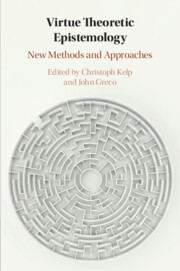Book contents
- Virtue Theoretic Epistemology
- Virtue Theoretic Epistemology
- Copyright page
- Contents
- Figures
- Contributors
- Acknowledgements
- Introduction
- Chapter 1 Closed-Mindedness As an Intellectual Vice
- Chapter 2 Epistemic Virtues and Virtues with Epistemic Content
- Chapter 3 Difficulty and Knowledge
- Chapter 4 What Is Epistemic Entitlement?
- Chapter 5 Knowledge-Producing Abilities
- Chapter 6 Virtue Epistemology, Two Kinds of Internalism, and the Intelligibility Problem
- Chapter 7 Knowledge Is Extrinsically Apt Belief
- Chapter 8 Explaining Knowledge
- Chapter 9 Anti-risk Virtue Epistemology
- Chapter 10 Responsibilism within Reason
- Index
- References
Chapter 5 - Knowledge-Producing Abilities
Published online by Cambridge University Press: 16 July 2020
- Virtue Theoretic Epistemology
- Virtue Theoretic Epistemology
- Copyright page
- Contents
- Figures
- Contributors
- Acknowledgements
- Introduction
- Chapter 1 Closed-Mindedness As an Intellectual Vice
- Chapter 2 Epistemic Virtues and Virtues with Epistemic Content
- Chapter 3 Difficulty and Knowledge
- Chapter 4 What Is Epistemic Entitlement?
- Chapter 5 Knowledge-Producing Abilities
- Chapter 6 Virtue Epistemology, Two Kinds of Internalism, and the Intelligibility Problem
- Chapter 7 Knowledge Is Extrinsically Apt Belief
- Chapter 8 Explaining Knowledge
- Chapter 9 Anti-risk Virtue Epistemology
- Chapter 10 Responsibilism within Reason
- Index
- References
Summary
What kind of abilities are apt for producing knowledge?Alternatively: How should we understand the notion of 'cognitive ability', in the virtue-theoretic idea that knowledge is true belief attributable to cognitive ability? Robust virtue epistemology understands the notion in such a way that the ability condition on knowledge entails a safety condition as well.Greco relativizes abilities to environments, Sosa does not.Pritchard's modest virtue epistemology denies that ability grounds safety, but adds an additional safety condition on knowledge.Turri (2011) requires that knowledge-producing abilities manifest safety as well as truth, while Turri (2015 and 2016) denies that knowledge requires safety.This chapter considers the dispute among these alternatives in light of questions regarding the value of knowledge:In what sense is knowledge valuable, and in what sense of 'ability' does success-from-ability give knowledge its value?The chapter defends a version of robust virtue epistemology in light of these questions.
- Type
- Chapter
- Information
- Virtue Theoretic EpistemologyNew Methods and Approaches, pp. 124 - 146Publisher: Cambridge University PressPrint publication year: 2020
References
- 10
- Cited by

